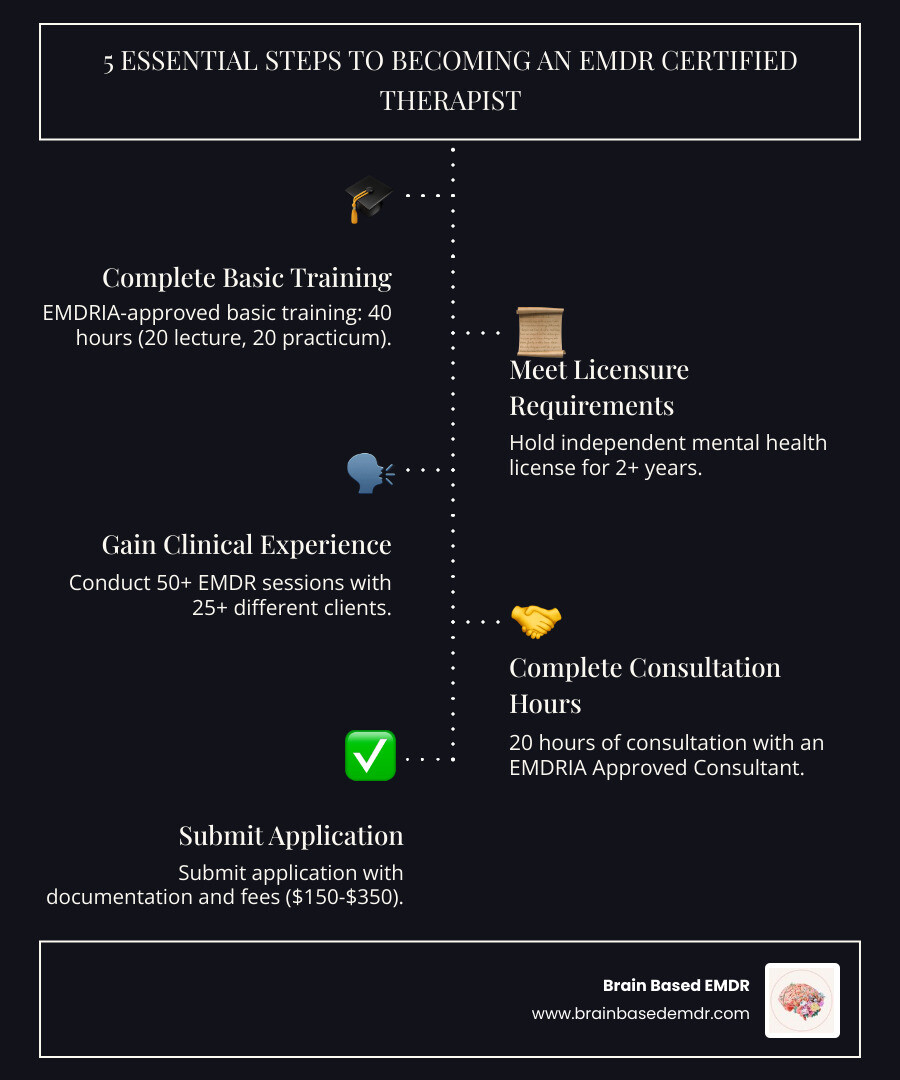Why Becoming an EMDR Certified Therapist Elevates Your Practice

The landscape of trauma therapy continues to evolve, and mental health professionals who pursue EMDR therapy training position themselves at the forefront of evidence-based treatment. An EMDRIA certified therapist represents the gold standard in trauma care—a practitioner who has demonstrated advanced competency through rigorous EMDR therapy training, extensive clinical practice, and supervised consultation.
At Brain Based Counseling & EMDR Intensives, this comprehensive credential goes far beyond basic training. It signifies our deep commitment to mastering EMDR therapy, ensuring we provide the highest standards of care.
Understanding EMDR Therapy and Its Transformative Impact
Eye Movement Desensitization and Reprocessing (EMDR) therapy has revolutionized how mental health professionals approach trauma treatment. Developed by Dr. Francine Shapiro, this transformative methodology addresses the root causes of trauma responses by helping clients process and integrate distressing memories and adverse life experiences through bilateral stimulation.
Unlike traditional talk therapies that primarily engage the conscious mind, EMDR therapy works with the brain's natural healing mechanisms. Dr. Francine Shapiro's eight-phase protocol guides clients through a structured process that reduces the emotional charge of traumatic memories while promoting adaptive resolution. This eye movement desensitization and reprocessing approach has transformed countless lives through its unique neurobiological foundation.
For mental health professionals seeking to expand their expertise, EMDR therapy training provides more than just another therapeutic tool—it offers a comprehensive framework for understanding how trauma affects the nervous system and how healing occurs at a neurobiological level. This brain-based approach provides clinicians with concrete methods for facilitating profound therapeutic breakthroughs while working with complex trauma presentations.
EMDR therapy has proven effective for treating post-traumatic stress disorder, depression, anxiety, and various other psychological conditions. The therapy's versatility makes it invaluable for clinicians working across diverse practice settings and client populations.
Whether you're working with clients in Raleigh, Virginia Beach, Las Vegas, or any other location, EMDR therapy provides a consistent, evidence-based approach that transcends geographical boundaries. Online EMDR therapy training has made this powerful methodology accessible to therapists nationwide, allowing practitioners from New York to Los Angeles to develop these essential skills through comprehensive EMDR basic training programs.
The Critical Distinction: Trained vs. Certified EMDR Therapist
Many mental health professionals begin their EMDR therapy journey by completing basic training, which provides the foundational knowledge needed to start using this approach with clients. However, the path from training to becoming a certified EMDR therapist represents a significant professional advancement that sets practitioners apart in the field of psychology and trauma treatment.
When you complete EMDRIA-approved basic training, you gain official recognition as an EMDR-trained therapist. This comprehensive program combines theoretical knowledge with hands-on practice, giving you the essential skills to begin integrating EMDR therapy into your clinical work. The entire training process includes lecture, practicum, and initial consultation components that prepare participants for real-world application.
Certification as an EMDRIA certified therapist, however, demonstrates a much deeper level of commitment and expertise. An EMDRIA certified therapist has invested in extensive clinical practice, undergone additional consultation hours, and proven their ability to consistently deliver effective results across diverse client presentations. This distinction matters significantly in professional practice and client outcomes.
Essential Requirements for EMDRIA Certified Therapist Status
The certification process involves several crucial components that ensure only the most qualified clinicians achieve this credential:
- EMDRIA-Approved Basic Training: Complete 40 hours of comprehensive EMDR basic training including lecture, practicum, and initial consultation
- Professional Licensure: Hold an independent practice license for at least two years as a mental health professional
- Clinical Experience: Conduct a minimum of 50 EMDR therapy sessions with at least 25 different clients
- Advanced Consultation: Complete 20 consultation hours with an EMDRIA approved consultant
- Continuing Education: Earn 12 hours of EMDRIA continuing education credits focused on EMDR therapy
- Application Process: Submit comprehensive documentation with required application fee
Each requirement serves a specific purpose in ensuring that certified therapists possess both the theoretical knowledge and practical experience necessary to handle complex trauma presentations safely and effectively. The rigorous nature of these requirements reflects the psychology field's commitment to maintaining the highest standards for EMDR therapy practice.

The EMDRIA Standard: Excellence in EMDR Therapy Training
The EMDR International Association (EMDRIA) serves as the global authority for EMDR therapy standards, training requirements, and certification processes. This organization maintains rigorous guidelines that ensure EMDR therapy practitioners worldwide meet consistent benchmarks for competency and ethical practice.
EMDRIA-approved training programs undergo comprehensive review to verify they meet strict curriculum requirements, provide adequate supervision, and maintain quality standards. When you choose an EMDRIA-approved program for your EMDR therapy training, you're investing in education that carries international recognition and credibility among mental health professionals.
The EMDR International Association continuously updates its standards based on emerging research and best practices in trauma treatment. This commitment to evidence-based evolution ensures that EMDRIA certification remains relevant and valuable throughout your career as an EMDR therapist.
For solo practitioners building their expertise, EMDRIA certification provides essential credibility that clients and colleagues recognize. Whether you're establishing your practice in Chicago, Dallas, or Highland Heights, this credential communicates your commitment to excellence in EMDR therapy and trauma care.
Training programs that meet EMDRIA standards ensure participants receive comprehensive education in both the theoretical foundations and practical applications of EMDR therapy. These programs prepare trainees to work effectively with diverse populations while maintaining the highest ethical and clinical standards.
Professional Benefits of EMDR Certification
Pursuing EMDRIA certified therapist status offers substantial advantages for your professional development and clinical effectiveness. The rigorous requirements ensure that you develop genuine expertise rather than surface-level familiarity with EMDR therapy protocols.
Enhanced Clinical Confidence Through Comprehensive Training
The required 50+ sessions and 20 consultation hours create opportunities for real-world application under expert guidance. This extensive practice allows you to encounter various client presentations and develop the clinical judgment necessary for complex trauma cases. Many therapists report that achieving certified status is when EMDR therapy truly becomes integrated into their therapeutic approach.
The combination of supervised practice and ongoing EMDR consultation helps you move beyond mechanical application to truly understanding the nuances of effective EMDR therapy. This depth of understanding proves invaluable when working with clients who present complex trauma histories or co-occurring conditions like depression.
Professional Credibility and Recognition in Mental Health
EMDRIA certified therapist status opens doors that remain closed to those with only basic training. Insurance panels often prefer or require certified practitioners, and referral sources consistently seek therapists with advanced credentials in EMDR therapy.
Being eligible for listing in EMDRIA's official directory connects you directly with clients seeking certified specialists. This visibility is particularly valuable for solo practitioners who rely on organic referrals and online visibility to build their client base. The "Find an EMDR" therapist directory serves as a trusted resource for individuals seeking qualified trauma treatment.
Expanded Treatment Capabilities for Complex Cases
Certification prepares you to work confidently with complex trauma presentations that require advanced skills. Developmental trauma, dissociative disorders, and attachment injuries demand the expertise that comes through extensive supervised practice and completion of comprehensive EMDR therapy training.
The therapeutic connection becomes even more crucial when working with complex trauma, and certification ensures you have the skills to maintain safety and effectiveness even in challenging clinical situations. Your ability to provide effective treatment planning becomes significantly enhanced through the certification process.
Your Comprehensive Path to EMDR Certification
The journey to becoming an EMDRIA certified therapist follows a clear progression, though the timeline varies based on your clinical practice setting and consultation availability.
Step 1: Complete EMDRIA-Approved Basic Training
Your certification journey begins with comprehensive EMDR basic training that covers Dr. Francine Shapiro's Adaptive Information Processing model and the complete eight-phase protocol. Quality training programs integrate theoretical understanding with practical application, ensuring participants understand both the "what" and "why" of EMDR therapy.
Brain-based approaches to EMDR therapy training help you grasp the neurobiological foundations of trauma and healing. When you understand how the brain processes traumatic experiences and adverse life experiences, and how EMDR therapy facilitates natural healing mechanisms, you become a more effective and confident practitioner.
Our online training format makes this essential education accessible to therapists across multiple locations, from Greenville to Las Vegas. This flexibility allows participants to begin their certification journey without geographic constraints while maintaining the rigorous standards expected in professional practice.
The entire training program includes both individual and group consultation components, giving trainees diverse learning experiences. Participants benefit from exposure to various case presentations and treatment approaches during their basic training completion.
Step 2: Meet Professional Practice Requirements
Before pursuing certification, EMDRIA requires that you hold an independent practice license for at least two years as a mental health professional. This experience requirement ensures you have a solid foundation in general therapeutic skills before specializing in EMDR therapy treatment.
This waiting period provides valuable time to develop your overall clinical abilities while planning your certification strategy. Use this time to identify potential consultation opportunities and begin building relationships within the EMDR therapy community. Many therapists find this preparation phase essential for successful program completion.
The licensure requirement reflects the psychology field's recognition that EMDR therapy requires seasoned clinical judgment and well-developed therapeutic skills. This foundation proves crucial when working with clients who have experienced complex trauma or adverse life experiences.
Step 3: Accumulate Extensive Clinical Experience
The clinical experience requirements are specific and purposeful: 50 EMDR therapy sessions with at least 25 different clients. These numbers ensure you've worked with diverse presentations and truly integrated the protocol into your professional practice.
Document your sessions carefully for verification purposes, noting dates and client information you'll need during the application process. This record-keeping demonstrates your commitment to professional accountability and helps track your progress toward certification completion.
The requirement for 25 different clients is particularly important, as it ensures you've experienced the full range of client responses to EMDR therapy and learned to adapt your approach accordingly. This diversity of experience proves invaluable when treating clients with varying trauma presentations and co-occurring conditions.
Step 4: Engage in Meaningful EMDR Consultation
The additional 20 consultation hours required for certification represent where competent EMDR therapists become exceptional practitioners. This supervision with an EMDRIA approved consultant provides targeted feedback on your developing skills and clinical decision-making.
At least 10 hours must be individual consultation, offering personalized attention to your specific learning needs and case presentations. The remaining consultation hours can be group consultation, which provides the added benefit of learning from peers' experiences and challenges in EMDR therapy practice.
EMDR consultation relationships often extend beyond the certification requirements, providing ongoing professional support throughout your career. These mentoring relationships contribute significantly to your long-term development as an EMDR therapy specialist and help ensure continued competency in this specialized area of treatment.

Understanding the Comprehensive Application Process
Once you've completed all requirements, the EMDRIA application process is straightforward but requires careful preparation and thorough documentation. The online portal streamlines submission while maintaining rigorous documentation standards for verification.
Required Documentation for Certification
Your application must include comprehensive documentation of each requirement:
- Certificate proving completion of EMDRIA-approved basic training
- Current professional license demonstrating at least two years of independent practice
- Notarized statement verifying your 50+ EMDR therapy sessions with 25+ different clients
- Documentation of 20 consultation hours with EMDRIA approved consultant(s)
- Letter of recommendation from your consultant
- Two professional references familiar with your clinical work
- Evidence of 12 hours of EMDRIA continuing education credits
- Signed agreement to adhere to EMDRIA policies and standards
Each piece of documentation undergoes careful review to ensure that only qualified clinicians achieve certified status. This thorough verification process maintains the integrity and value of EMDRIA certified therapist credentials.
Timeline and Professional Investment
Application fees vary based on EMDRIA membership status, with significant savings available for members. The review process typically takes 3-5 weeks, during which EMDRIA's committee thoroughly evaluates your documentation and verifies completion of all requirements.
Your certification remains valid for two years, after which renewal requires demonstration of ongoing continuing education and adherence to professional standards. This ensures certified therapists remain current with evolving best practices in EMDR therapy and trauma treatment.
For specific information about current application fees and scheduling your certification journey, we encourage you to contact our office directly.
Advanced Opportunities Beyond Basic Certification
EMDRIA certified therapist status often marks the beginning rather than the end of your professional development in EMDR therapy. Many certified therapists pursue advanced training in specialty areas or complex trauma presentations.
Consultant Track for Leadership Development
For those called to mentor other therapists, the path to becoming an EMDRIA approved consultant represents the pinnacle of EMDR therapy expertise. The Consultant-in-Training (CIT) track teaches advanced skills while allowing you to begin providing consultation to other developing practitioners.
This leadership role allows you to contribute meaningfully to the field's growth while continuing your own professional development. The demand for qualified consultants remains strong across all regions, from Hickory to Virginia Beach, as more clinicians seek EMDR therapy training.
Specialized Training Opportunities
Advanced EMDR therapy training addresses specific populations and complex presentations. Specializations include working with children, couples, addictions, and various trauma types. Each specialty area brings unique considerations and specialized protocols that build upon your foundational certification.
Online advanced training options provide flexibility for solo practitioners who need to maintain their existing client commitments while pursuing additional expertise. These programs often include intensive workshops, ongoing consultation, and community-building opportunities for continued professional growth.
Frequently Asked Questions About EMDR Certification
How long does certification typically take after completing basic training?
Most therapists complete certification requirements within 1-2 years after EMDR basic training, depending on their caseload and consultation availability. The timeline is highly individual and depends on your practice setting and client population focus.
What's the difference between EMDRIA credits and standard continuing education?
Standard continuing education maintains your professional license, while EMDRIA credits specifically advance your EMDR therapy expertise. The 12 required EMDRIA credits ensure you stay current with the latest research and developments in trauma treatment and psychology.
Can I use a Consultant-in-Training for my consultation hours?
Yes, you can complete up to 15 of your required 20 consultation hours with an EMDRIA approved Consultant-in-Training. The remaining 5 hours must be with a fully approved consultant, ensuring you receive guidance from someone with extensive supervisory experience in EMDR therapy.
How does online EMDR therapy training compare to in-person options?
Online EMDR therapy training has evolved significantly and now provides comprehensive education that rivals traditional in-person formats. Interactive components, small group practice sessions, and real-time supervision ensure trainees receive thorough preparation regardless of their location.
Are there assistance options available during training?
If you require assistance due to a disability or specific need, contact your training program provider directly to discuss available accommodations and support services. Most quality programs work to ensure all eligible participants can successfully complete their EMDR therapy training.

Elevating Your Practice Through EMDR Certification
The decision to pursue EMDRIA certified therapist status represents more than professional advancement—it's a commitment to providing the highest standard of trauma care through evidence-based EMDR therapy. Your clients deserve a therapist who has invested deeply in mastering this life-changing approach to healing.
Certification transforms not only your clinical capabilities but also your professional identity as an EMDR therapist. You join a community of practitioners dedicated to excellence in trauma treatment, gaining access to ongoing support, advanced learning opportunities, and professional recognition within the psychology and mental health fields.
At Brain Based EMDR, our solo practitioner understands the unique challenges and opportunities that come with building expertise in EMDR therapy. Our neuroscience-informed approach helps you understand the biological foundations of healing, making you a more confident and effective certified practitioner.
Whether you're beginning your EMDR therapy journey or ready to advance from training to certification, investing in comprehensive education pays dividends for your entire career. Your commitment to excellence becomes evident in every therapy session, and your clients experience the difference that comes from working with a truly qualified trauma specialist.
The completion of EMDR certification represents a significant milestone in your professional development, opening doors to advanced practice opportunities and specialized client populations. Your expertise in EMDR therapy becomes a valuable asset that benefits both your practice growth and your clients' healing journeys.
Ready to take the next step in your professional development? Contact us today to learn more about our EMDR Basic Training program and begin your journey toward becoming an EMDRIA certified therapist. Your expertise matters, and your clients deserve nothing less than the highest standard of EMDR therapy care.
